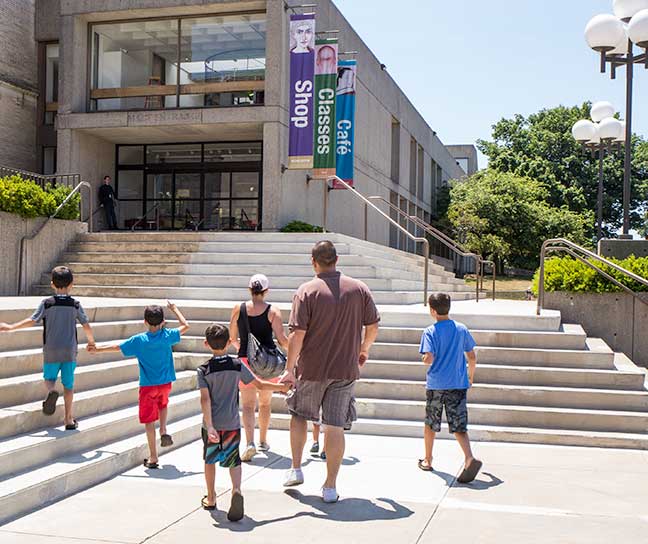WORCESTER ART MUSEUM RECEIVES CAPITAL GRANT FROM THE MASSACHUSETTS CULTURAL FACILITIES FUND FOR THE LANCASTER PLAZA PROJECT

Worcester, MA—The Worcester Art Museum (WAM) today announced it has been awarded a $200,000 Capital Grant from the Massachusetts Cultural Facilities Fund (CFF) for its Lancaster Plaza Project. This is the maximum amount awarded this year through this competitive state program, co-administered by the Mass Cultural Council and MassDevelopment, that provides capital and planning grants to nonprofits, collections, and municipalities that own or operate facilities primarily focused on the arts, humanities, and sciences. CFF awards invest in the acquisition, design, repair, renovation, expansion, and construction of nonprofit and municipal cultural facilities.
“We are so very grateful to the Mass Cultural Council and MassDevelopment for this generous award, which will help make the Museum’s busiest entrance fully accessible to ALL audiences, including people who use wheelchairs or have limited mobility, families with strollers, and people who just prefer another option to steps,” said Matthias Waschek, Jean and Myles McDonough Director of the Worcester Art Museum.
“Improving accessibility and equity at our state cultural organizations is a priority of the Mass Cultural Council, and I am proud that CFF funds will go to improve access to the beautiful Worcester Art Museum,” said Anita Walker, Executive Director, Mass Cultural Council. “CFF grants will also boost jobs in the construction industry at this critical time of increased unemployment, while investing in the cultural sector which is critical to the vitality of Main Street businesses.”
A cornerstone of the Worcester Art Museum’s Campus Master Plan, the Lancaster Plaza Project addresses the Museum’s most critical access, maintenance, security, and safety concern: the deteriorating exterior stairs and lack of full accessibility at its Lancaster Street entrance. The project, kick started with a pivotal gift provided to WAM by the Jean and Myles McDonough Charitable Foundation, supports the Museum’s strategic priorities of providing greater access to its distinguished collection and educational opportunities and in creating a more welcoming place for people of all ages, backgrounds, and abilities.
WAM’s Lancaster Street side entrance is used by 90% of the Museum’s 110,000-plus annual visitors and students due to its close proximity to the primary parking lot and convenience to the Café and Higgins Education Wing, where youth, teen, and adult art educational programming takes place. The construction project includes the complete removal of the stairs, down to street level, and their replacement by a much more hospitable staircase leading to the existing Lancaster Lobby along with a new, fully accessible elevator with direct access to the Higgins Education Wing.
Support for this project is also generously provided by the Amelia Peabody Charitable Fund, Ruth H. and Warren A. Ellsworth Foundation, Fred Harris Daniels Foundation, and the Hoche-Scofield Foundation.
About the Massachusetts Cultural Facilities Fund
An initiative of the state of Massachusetts, the Massachusetts Cultural Facilities Fund (CFF) was created by an act of the Legislature in 2006 to achieve the following goals:
Enhance Massachusetts’ creative economy through financing for acquisition, construction, expansion, renovation, and repair of cultural facilities.
Increase employment, entrepreneurialism, and tourism in the regions where these facilities are located, especially drawing new visitors from outside the Commonwealth.
Stimulate further investment in the arts, heritage, and sciences by preserving cultural resources.
Over 13 years the CFF has awarded $129 million to 1,063 projects across the Commonwealth, employing more than 29,350 architects, engineers, contractors, and construction workers. The nonprofit organizations engaged in this work expect to add 2,500 new permanent jobs after completing their projects.
All grants from the Fund have a 1:1 cash match requirement. Nonprofit cultural organizations, municipalities, and colleges or universities that own cultural facilities are eligible to apply. For more information, visit the Mass Cultural Council website.
About the Worcester Art Museum
The Worcester Art Museum creates transformative programs and exhibitions, drawing on its exceptional collection of art. Dating from 3,000 BC to the present, these works provide the foundation for a focus on audience engagement, connecting visitors of all ages and abilities with inspiring art and demonstrating its enduring relevance to daily life. Creative initiatives—including pioneering collaborative programs with local schools, fresh approaches to exhibition design and in-gallery teaching, and a long history of studio class instruction—offer opportunities for diverse audiences to experience art and learn both from and with artists.
Since its founding in 1896, the Worcester Art Museum has assembled a collection of 38,000 objects: from the ancient Near East and Asia, to European and American paintings and sculptures, and continuing with works by contemporary artists from around the world. WAM has a history of making large scale acquisitions, such as its Medieval Chapter House, the Worcester Hunt Mosaic, its 15th-century Spanish ceiling, and the Flemish Last Judgment tapestry. In 2013, the Museum acquired the John Woodman Higgins Armory Collection, comprising two thousand arms and armor objects. It continues to commission and present new works, such as 2017’s installation of the immersive Reusable Universes sculptural series and Organic Concept environment by Shih Chieh Huang. For more information about the Worcester Art Museum,
